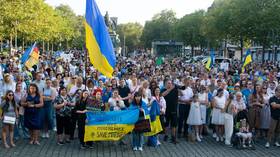Almost 250,000 Ukrainians in Germany lose ‘protected’ status – Eurostat

Hundreds of thousands of Ukrainian refugees have lost their temporary protection status in Germany in the course of just one month, according to new analysis published by EU statistics bureau Eurostat on Tuesday.
The status, introduced by the European Council, grants immigrants from Ukraine the right to an extended visa-free stay in the country, as well as free accommodation, medical care, and education.
At the end of July, some 1,110,600 Ukrainians in Germany reportedly had temporary protection – the highest number in the EU and roughly a quarter of all migrants in the bloc.
However, this number represented a drop of some 236,925 people compared to the previous month.
According to Eurostat, many people had their temporary protection status invalidated, either because they had been recategorized or left Germany altogether.
However, the sudden drop also comes amid growing criticism of the German government over its preferential treatment of Ukrainian refugees, who have been receiving special benefits not granted to asylum claimants from other countries.
One of the main issues has been that Ukrainian migrants in Germany have been entitled to a ‘citizen’s benefit’ of €563 ($610) per month – a level of support markedly higher than in other EU states and usually reserved for low-income German citizens or other EU nationals living in the country.
German opposition parties, including the conservative Christian Social Union (CSU), have argued that the handouts have also been discouraging Ukrainians from looking for work. Deutsche Welle reported earlier this year that the employment rate among Ukrainian refugees in Germany stood at only 20% – among the lowest compared to those in other host nations.
In June, CSU MP Alexander Dobrindt insisted that Berlin should review its social welfare policies and demand “stronger cooperation obligations for asylum seekers when it comes to taking up work.” He called on the authorities to pressure Ukrainian migrants into finding a job and deport those who refused to integrate.
Bavarian Interior Minister Joachim Herrmann has also argued that Berlin should be incentivizing draft-eligible Ukrainian men to return to their home country. His counterpart from Baden-Wuerttemberg, Thomas Strobl, also suggested that the welfare handouts to refugees were impeding the “Ukrainians’ defensive fight” by discouraging able-bodied Ukrainians from participating in the conflict.













